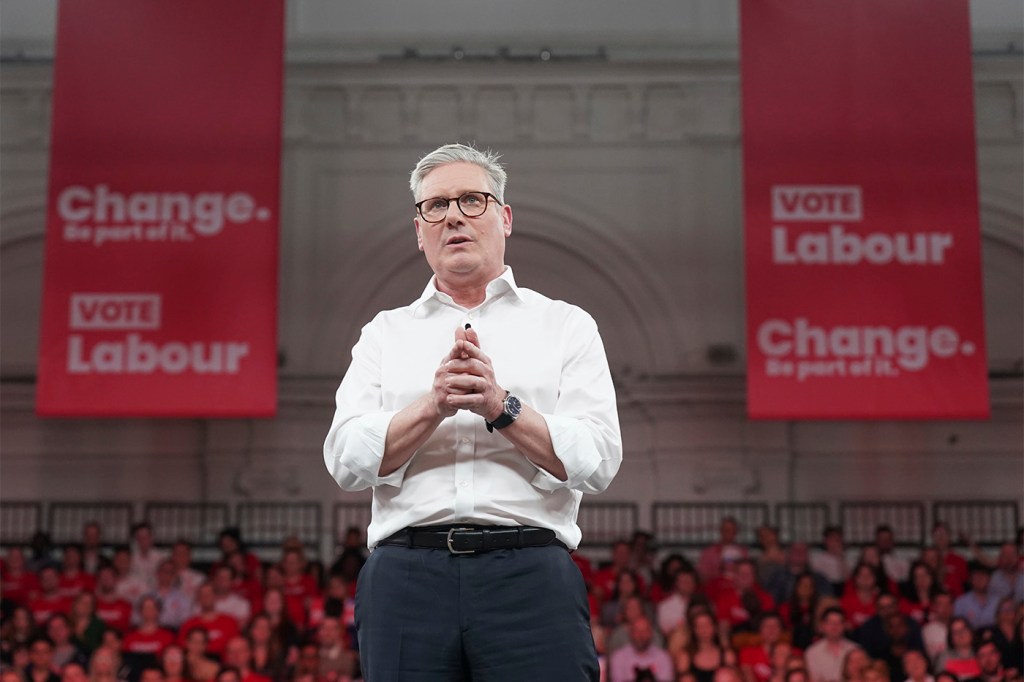Keir Starmer becomes British prime minister in landslide Labour Party victory. Experts analyze how the result unfolded
Northeastern academics explain what happened and assess what is next for British politics after Starmer’s historic victory over Rishi Sunak, his Conservative Party rival.

LONDON — Change — the single word written on every Labour Party general election campaign flier, poster and leaflet. And the British electorate delivered, ushering in a seismic change.
But despite voters handing the new U.K. prime minister, Keir Starmer, a landslide victory, there was no stampede of support for him and his outfit.
In the 2019 general election, Labour recorded its worst performance since 1935, picking up 202 seats in the House of Commons legislature off the back of a 32.1% national vote share. In Thursday’s general election, the party won 412 out of 650 seats — a majority of 170 — having secured a vote share of 33.7%, which was just 1.7 percentage points higher than its showing five years ago.
So how has Starmer ended up ousting Rishi Sunak, his Conservative Party rival, from 10 Downing Street on such small gains?
Josephine Harmon, an assistant professor of political science at Northeastern University in London, says British voters elected a Labour government for the first time in almost 20 years for pragmatic reasons.
‘Landslide that was won with a glum’
“Interestingly, this is a Labour landslide that was not won with a kind of euphoria like Tony Blair’s 1997 election,” she says. “This was a landslide that was won with a glum, orderly sense of pragmatism from the British public who were voting in their interests.
“They were saying in focus groups, ‘I’m not crazy about Starmer but it is better than the alternative.’ But usually that isn’t enough to get you a landslide.”
Labour was aided by a collapse in support in Scotland for the Scottish National Party and voters turning away from the Tories in England and parts of Wales.
At the last election, then Conservative Party prime minister Boris Johnson won an 80-seat Commons majority with the pledge to “Get Brexit done” and remove the parliamentary stalemate that was preventing the enactment of the U.K.’s decision in the 2016 referendum to leave the European Union.
On his way to victory, Johnson took great swathes of seats in former industrial areas in England and Wales that had traditionally voted Labour. In less than half a decade, that majority has not only been squandered but entirely abrogated, with the Tories’ producing their worst result in almost 200 years.
Brexit and its economic impact to blame
Harmon argues that, in a reverse of fortunes, Brexit and its economic impact became one of the factors that cost the Tories’ in this election. Sunak’s party lost 20% of its vote share, 250 seats and a host of senior figures, including the former short-lived prime minister Liz Truss and defense secretary Grant Shapps, were sacked by the electorate.
“Frankly, you can trace this back to the Brexit referendum and the fact it changed Conservative politics,” Harmon says. “It became the wedge issue in British politics and the raison d’etre of the Conservative Party.
“Clearly that, in combination with the Ukraine war, had an impact on our economy that I think we are still feeling today — and then there was also the pandemic. So you have had essentially this big break from Europe, succeeded by two major economic crises that nobody saw coming.
“So it is a mixture of factors that have all created this really bad economic situation in the country, both in terms of people’s personal finances, their income, their own costs and the services that they are able to receive, which feels substandard.”
Also, a split of the vote on the right
Another reason Labour’s victory was so sizable is because there was a split of the vote on the right. Anywhere the Tories were competitive against Labour, the anti-immigration party Reform, led by Nigel Farage — a prominent figure in British politics and cheerleader for Donald Trump — cut them off at the knees.
Harmon points out that if you put together the Conservative vote share of 24% and Reform’s 14%, the right would have defeated Labour.
Farage in 2019 cleared the way for Johnson’s landslide by standing down his Eurosceptic candidates in constituencies where the pro-Brexit Tories had a chance of beating Labour. This time around, there was no such pact as Reform went after both Labour and Tory seats.
In the early hours of Friday morning, Farage achieved a lifelong ambition — at the eighth attempt of trying, he became a member of Parliament. He told those gathered at the count in Clacton-on-Sea, the constituency in the east of England he will represent in the Commons, that his victory was “the first step of something that is going to stun all of you.”
Reform ended up taking five seats in total. The presence of their MPs in Parliament is likely to give an air of “legitimacy” to some of Farage’s hard-right policies, according to Marianna Griffini, an assistant professor in international relations and anthropology at Northeastern.
‘Feelings of resentment and despondency’
Griffini, a populism expert, says Reform was, like elsewhere among the hard-right in Europe, able to “speak to the feelings of resentment and despondency” felt in some corners of Britain, especially in pro-Brexit areas.
The U.K.’s first-past-the-post electoral system and its winner-takes-it-all outcome has often been hailed as a strong barrier to far-right parties gaining a hold in terms of parliamentary presence.
Featured Posts
Despite this proving true, with Reform’s 14% vote share securing them just five MPs, Griffini says the election will give Reform a bigger platform to air its policies — such as freezing all so-called “non-essential” migration, charging higher taxes on migrant workers and sending back to mainland Europe any unlawful migrants arriving via the English Channel in small boats.
“Of course, we don’t have Nigel Farage as prime minister but, still, it may empower and bolster the feeling of confidence that Reform has,” she says. “This may actually lead them to winning even more seats at the next elections. I do think that it may give them legitimacy — it affords them a legitimate arena in which to express their ideas.”
Harmon says whoever leads the Conservatives next, with Sunak announcing plans to stand down, that person will have to “figure out who their constituency is now” following the loss of some of its south-east England heartlands and Reform eating into its vote.
Tories at risk of losing its core support
But Griffini argues that the Tories could be at risk of losing its core support if it looks to chase Reform voters.
“The Tories have already moved more and more to the right,” she says. “So I don’t know to what extent they can become even more radicalized without losing their core constituencies.
“They have radicalized quite a lot, particularly the policies that were enacted regarding immigration, with the famous plan [to deport unlawful migrants to Rwanda] and all the discourse against the small boats.”
Historian Edmund Neill, an expert in British conservatism, says there is “precedent” for such poor performance at the polls by the Conservative Party.
The head of history and art history at Northeastern in London says 1906 was “catastrophic,” with the party seen as focusing on wayward issues, while it took three elections for the Tories to recover from the drumming it received at the hands of Blair in 1997.
But the closest comparison, says the associate professor of modern history, is one that harks back almost 180 years.
“The best precedent for this is in the middle of the 19th century,” says Neill, “when… after the fall of the [Robert] Peel government and the split in 1846 over free trade, it wasn’t really clear what the Conservative Party was for until about the 1870s.
“It took them a generation to recover and it could be that that happens again.
“I think, for right now, that is the story — will the Tory Party recover and do they have the people savvy enough to do it? They had a few more MPs, I think, in the middle of the 19th century but I think they almost had a similar existential problem, which was, what is the Conservative Party for?”
As the Tory rebuild gets underway, the Labour Party has more pressing matters to concern itself with as it turns its attention to governing for the first time in 14 years. Starmer, in his first speech as prime minister, said the country had “voted decisively for change” and promised to embark on a “mission of national renewal.”
“Our work is urgent and we begin it today,” he vowed.
The “number one” priority for Labour, Harmons says, is likely to be improving the economy. But they will be constrained in that regard, she points out, having pledged during the campaign not to put up taxes, in Starmer’s words, on “working people.”
“This next term will be a litmus test about whether they can do something on the economy,” Harmon continues. “It won’t be easy to do that in five years. It takes a while for those policies to percolate through — but that is how they are going to be judged in five years’ time.
“So they are going to have to get to work straight away and potentially look at short-term options to try and get a bit of juice, to get a bit of growth in there.”











